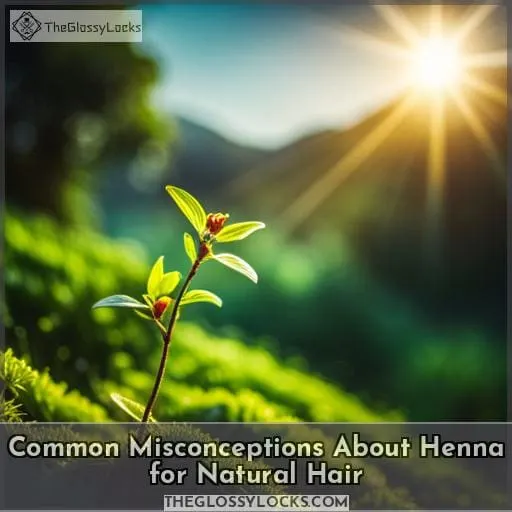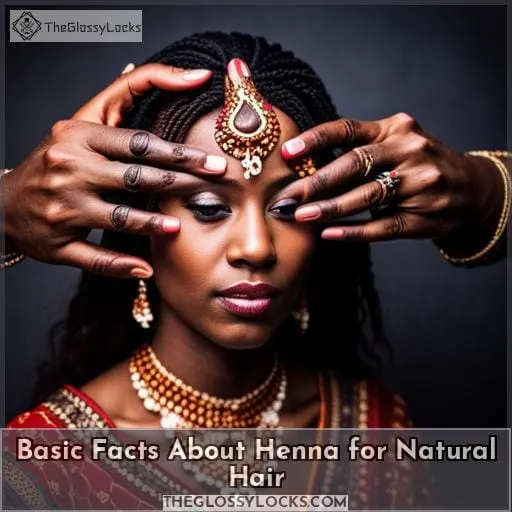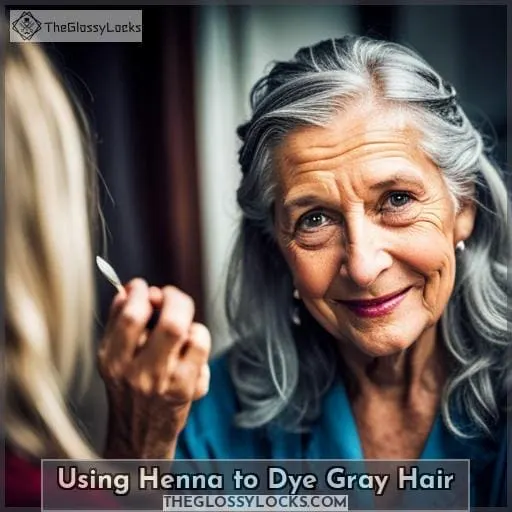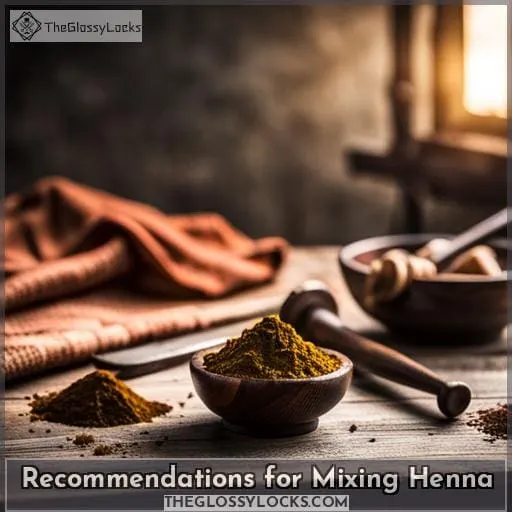This site is supported by our readers. We may earn a commission, at no cost to you, if you purchase through links.
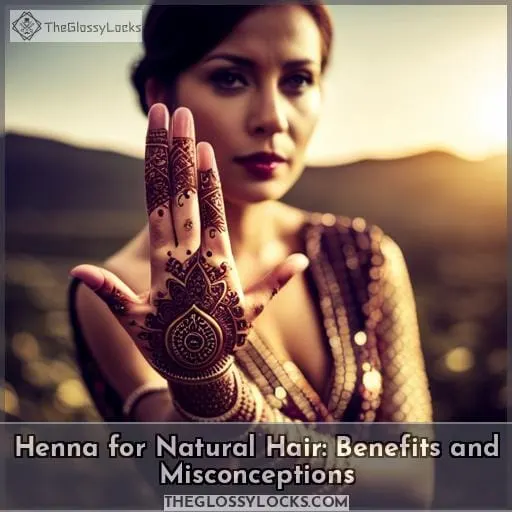
Unfortunately, there are some misconceptions around what henna does to your hair texture and how it interacts with professional color services. In this article, I’ll be discussing the history behind henna’s use in haircare as well as explaining its various benefits.
This way, you can make an informed decision on whether or not to use it for your own natural tresses.
Get ready because once you try out these beneficial effects of henna on your locks, it will be hard to go back!
Table Of Contents
- Key Takeaways
- What is Henna and What Are Its Benefits for Natural Hair?
- Can Henna Cause Dryness and Brittle Hair?
- How Does Henna Affect Professional Color Services?
- Does Henna Make Hair Difficult to Absorb Water and Products?
- Understanding the History and Benefits of Henna
- Common Misconceptions About Henna for Natural Hair
- Basic Facts About Henna for Natural Hair
- Using Henna to Dye Gray Hair
- Recommendations for Mixing Henna
- Tips for Applying Henna to Natural Hair
- Recommended Brands of Henna for Natural Hair
- Conclusion
Key Takeaways
- Henna is a natural hair dye and conditioner.
- Henna can be used to improve scalp health and stimulate hair growth.
- Henna may cause dryness and brittleness in certain hair types, so proper hydration is crucial.
- Henna can limit options for professional color services and make hair resistant to moisture and product absorption.
What is Henna and What Are Its Benefits for Natural Hair?
Are you seeking ways to enhance the health of your natural hair? Look no further than henna! Henna, derived from the Lawsonia inermis plant, is known to provide multiple benefits such as improved scalp health, stimulated hair growth, conditioned hair, and added shine.
Improved Scalp Health
You can feel your scalp come alive with nourishment as the henna is applied, transforming dullness to luster and promoting healthier growth. Henna helps boost scalp health, which in turn leads to hair growth and thicker strands.
It offers conditioning effects that make styling easier while allowing you to maintain color preferences without damaging your hair. You’ll also get more volume from root-only treatments as they preserve curls better than full head applications of henna.
Stimulated Hair Growth
By adding essential oils to your henna mix, you can stimulate hair growth and achieve healthier locks. Some of the most effective options include rosemary, lavender, peppermint, cedarwood, and tea tree oil.
These oils have anti-bacterial properties that promote circulation in the scalp and nourish it with vitamins from natural sources.
Additionally, these oils are perfect substitutes for synthetic coloring agents found in many traditional dyes. They do not contain any harsh chemicals or irritants that could further damage already fragile strands.
Conditioned Hair
After your henna treatment, your hair will be left feeling revitalized and reborn – like a phoenix rising from the ashes. Moisture retention is improved as henna seals in hydration, while curl preservation gives you a glossy finish with just a hint of a red tint.
Henna gloss can also help keep strands conditioned without compromising color or texture; it’s an easy-to-apply mix of conditioner and henna for natural hair care.
Added Shine
Using a deep conditioner after a henna treatment will give your locks added shine and manageability. You can achieve the desired look with subtle color and extra conditioning by applying a henna gloss, which is a mix of henna and conditioner.
It’s easier to apply than full-strength henna and still offers pliability for styling curls or waves without drying out your hair.
For those who want more intense coloring options, pairing henna with indigo creates glossy black tresses.
Apply to Various Hairstyles
No matter your hairstyle, henna is a great way to add some extra shine without sacrificing hair health.
Whether you have tight curls, loose waves, braids, or locs, all hair textures can benefit from henna use. Its styling versatility allows you to explore different coloring techniques while still maintaining healthy strands.
For application tips that work with various lengths and types of hair, opt for smooth mixtures made with specific ingredients like lemon juice or apple cider vinegar.
Incorporate these natural products into your routine regularly for optimal benefits!
Can Henna Cause Dryness and Brittle Hair?
Be aware that henna can cause dryness and brittleness in your hair, especially for those with medium to low porosity. To prevent this from happening, it’s important to incorporate hydration into your regular hair care routine.
Regular deep conditioning treatments should be done before applying henna and afterwards as well in order to combat the drying effects of the dye on natural tresses.
Additionally, you must ensure that you are using enough moisture when mixing up a batch of henna for application as too little water will result in an overly drying effect on the strands once applied.
Remember: Henna is not always best suited for natural curls; if used improperly it may lead to damage rather than healthier-looking locks – so consider all pros and cons carefully before beginning treatment!
How Does Henna Affect Professional Color Services?
When considering professional color services, it’s important to keep in mind that henna may limit your options. This effect on color services is due to the way henna coats the hair and impedes absorption of water and conditioning products.
Henna can make any professional coloring challenging while preserving hair integrity, especially for medium to low porosity natural strands.
- Hair dye compatibility – Some dyes won’t work after using henna as permanent colors tend not to take well over already-colored locks.
- Professional Color Challenges – It can be hard for professionals who do regular highlights or use multiple colors because they won’t know how long their results will last.
- Henna’s Color Impact – The strong staining properties of red/brown hues from some brands make them difficult (if not impossible!) to remove or cover up with other dyes without causing damage.
Hair health should always remain a top priority when deciding whether you want to use traditional chemical treatments vs natural ones like those found in plant-based dyes such as hennas.
Does Henna Make Hair Difficult to Absorb Water and Products?
Henna can coat strands, potentially making them resistant to moisture and product absorption. This is an important factor when considering using henna for natural hair. It’s possible that the layers of coating on the hair may prevent water from penetrating into each strand as well as other products like conditioners or oils, leading to dryness and lack of hydration in the long run.
The effects will vary depending on porosity levels, texture type, and environmental factors such as humidity or wind speed. Additionally, how often a person uses henna treatments can also impact the results.
It is essential that people looking to incorporate henna into their routine do some research beforehand. This will help them understand what could be impacted by frequent use over time, including potential color changes if desired in future appointments with professionals or even DIY methods.
Consulting a professional before starting any kind of vegan hair dye regimen would ensure potential issues are prevented while still achieving beautiful results safely.
Understanding the History and Benefits of Henna
Henna has been a popular natural hair dye for centuries, offering many benefits to those with graying or unruly strands. It can help improve the texture of your hair by making it strong and shiny, while also reducing breakage and shrinkage.
Furthermore, henna gloss is an excellent way to achieve subtle color as well as deep conditioning without any of the red staining that comes with regular henna treatments.
Henna’s impact on hair texture
You may have noticed that henna can make your hair feel smoother and more manageable, but it’s important to understand the impact of frequent henna treatments on your texture.
Henna has been used for centuries to strengthen and improve hair health, as well as give a smoother texture with reduced shrinkage. Depending on your curl pattern or porosity level, you may find that henna loosens curls after multiple applications.
For this reason, root-only treatments are recommended if preserving curls is desired while still using natural products like henna or cassia without the red tint from full-strength henna mixtures.
A gloss regimen consisting of conditioner and tea is also an option for subtle color effects with deep conditioning benefits without staining darker colored hairs too much either!
Ultimately, practice caution when considering any product containing metallic salts such as BAQ quality henna so you don’t put yourself at risk of damaging delicate strands in pursuit of healthier-looking locks!
Henna for graying hair
For graying hair, multiple applications are needed to achieve desired results. To get the best outcome, begin with a henna gloss regimen: conditioning and tea for subtle color and deep nourishment. Then progress to a full-strength henna treatment monthly or bi-monthly for optimum coloration and scalp health benefits.
Cleansing before application is key. Balance is crucial as excessive henna can weigh down fine strands.
Experienced hennistas share tips on mixing and applying the product correctly, as well as advice on preventing dryness from overuse of Henna, so gray hairs can be dyed without compromising texture!
The benefits of henna gloss
By incorporating a henna gloss regimen into your hair care routine, you can enjoy its conditioning effects without the red color that regular henna offers – plus, up to 40% more shine! Henna glossing provides healthier and vibrant hair while maintaining integrity.
Regular application helps keep colored or highlighted styles conditioned. It’s also ideal for those with various hairstyles who want subtle color results without having to apply full strength henna every time.
Maintenance is simple; just use a deep conditioner after each treatment and incorporate it into your monthly beauty regimen.
Common Misconceptions About Henna for Natural Hair
Although there are many benefits to using henna for your hair, it’s important to be aware of the common misconceptions about its effects on natural curls. Henna will not damage healthy hair; however, if you plan on using professional color services afterwards that require heat or lightening products, henna can cause complications.
Additionally:
- It is often thought that all types of curly and kinky textured hair respond similarly when treated with henna, but this is not always true.
- The application process for a full-strength treatment requires precision and experienced hands, so be sure to follow instructions properly in order to minimize any potential problems from occurring, such as dryness or brittleness due to overuse.
- A patch test should also be done before each application since reactions vary between individuals depending on their scalp sensitivity level and current condition of their locks!
On the other hand, incorporating a weekly or biweekly deep conditioning regimen along with regular thorough cleansing can help maintain moisture levels despite frequent applications of henna gloss mixtures, which are lighter than traditional treatments yet still offer great results in terms of deeper conditioning without significantly changing texture or adding too much red pigment onto darker strands.
In addition, instead of opting out completely, Henndigo (Henna + Indigo) combinations provide stunning vibrant hues without sacrificing elasticity or adversely affecting overall healthiness while allowing more options regarding color changes down the line if desired!
Basic Facts About Henna for Natural Hair
When it comes to using henna for natural hair, there are a few points of consideration. It is important to ensure you purchase quality henna that is free from additives and chemicals, as this will affect how the product performs on your locks.
Additionally, understanding what type of results you can expect in terms of color and texture changes when applying henna will help you make an informed decision about using this popular herbal remedy.
Quality of Henna
It’s important to assess the quality of henna before committing to a full treatment. It should be pure, free from additives, and certified for its authenticity. Many brands are not vegan or organic, so always check the ingredients list before buying any product.
Henna staining can vary widely depending on the quality and purity of henna used; low-grade products may not produce the desired results or last as long as expected. To get optimal color payoff, carefully research different brands and find ones with high ratings that fit within your budget range.
Performance of Henna
Discover how a henna treatment can deliver stronger, shinier locks and reduce breakage! Understand that the longevity of your henna-treated hair depends on its curl pattern. For tighter curls, you’ll need fewer treatments to maintain color than for looser curls.
Color variations are also possible with multiple applications. Try mixing in Indigo powder or adding a gloss for subtle highlights. Henna gloss is an easy way to get deep conditioning benefits without full strength dyeing, but it may leave some red tint on dark hair tones.
Depending on what you’re trying to achieve with your natural look, patience while using henna will be key.
Testimonials from the tight curl community attest that consistent care brings out beautiful colors after several sessions. Don’t forget about proper nourishment either through conditioning regularly or prepping the scalp before application.
Using Henna to Dye Gray Hair
To get your gray locks looking glossy, henna is the way to go! Henna application can help you cover up gray hair and give it a natural color. Mixing henna with an acidic ingredient like lemon or apple cider vinegar helps ensure even coverage and maximum color saturation.
The key to achieving great results when using henna on gray hair is multiple applications. Start off by applying it every week for three weeks, then reduce the frequency depending on desired results.
To achieve darker shades of red, add indigo powder into the mix as well. This will also enhance its conditioning effects on dry strands, making them soft and shiny.
Before using henna for natural dyeing, make sure you purchase body art quality (BAQ) from reliable suppliers such as SeeSomeCurls Visual Library.
With regular use, expect compliments from everyone around who won’t believe how much your look has changed thanks to a simple yet powerful transformation tool – all-natural Henna dye!
Recommendations for Mixing Henna
Unlock the secrets to creating a perfect henna mix for gloriously glossy gray hair! Use essential oils and acidic ingredients to make your own customized henna mix. Start by researching which types of oil will work best with your specific hair type and needs.
You’ll also need an acidic ingredient such as lemon juice or apple cider vinegar to activate the dye in the henna powder. When mixing these ingredients together, it’s important to keep track of ratios so that they combine correctly.
Too much acid could damage your scalp or tangle up curls, while not enough won’t give desired results.
Finally, consider adding moisturizing conditioners into the mixture before application to help manage any messiness during rinsing and styling afterward.
Tips for Applying Henna to Natural Hair
Ready to take your natural hair color game up a notch? Applying henna to your hair can yield some amazing results, but you’ll want to find the perfect color and be sure to follow instructions carefully to stay safe.
Finding the Perfect Color
Choosing the right shade of henna can be tricky, but you’ll know when you’ve found your perfect hue. With some experimentation and research, customizing color is possible for a natural look or something bolder.
Henna also affects hair health. To maintain desired results, use good quality products and regular treatments. For those worried about staining their hair too darkly, cassia is an alternative that conditions without much color change.
Whatever choice you make, ensure proper prep work before application. Cleansing the scalp thoroughly beforehand will help keep the desired tone longer, while conditioning afterwards helps maintain moisture levels in weakened strands post-henna treatment.
Following Instructions Carefully
Follow the instructions carefully when using henna on your hair for the best results. Read up on all the tips and tricks beforehand to make sure you’re properly prepping, mixing, and applying it.
Have a dedicated area that’s easy to clean in case of accidental spills or messes.
Make sure everything is blended evenly before applying it to your scalp and strands.
When you’re done, let it sit for several hours before rinsing it out thoroughly with lukewarm water until all traces are gone from your skin and hair.
Staying Safe
It’s important to stay safe when using henna on your natural hair, so always do research and proceed with caution. Patch testing is crucial before full application as it ensures you won’t suffer a reaction or irritation.
Moisture balance should also be considered. Excess henna can weigh down fine strands, while conditioning is necessary for elasticity and hydration.
Color consultation will provide guidance for desired results without damage. Plus, there are options like Henna Gloss which offer subtle color and deep conditioning with less messiness than regular strength preparations!
Ultimately, understanding the effects of henna on your hair health can help maintain beautiful curls that won’t fall victim to its drying tendencies.
Avoiding Excessive Heat Afterwards
To keep your hair healthy after using henna, try to limit heat styling and opt for air-drying instead. Protect your locks from the damage of excessive heat by applying a heat protectant before blow-drying or flat ironing.
You can also use protective hairstyles like braids or twists that reduce breakage when exposed to high temperatures.
Keep in mind that post henna care is essential for preserving moisture and elasticity. Look out for products with natural oils like jojoba oil, avocado oil, and coconut oil, as these will help fortify strands against dryness caused by too much heated styling tools.
To top it off, always finish up any style with a serum designed specifically for protecting against environmental factors such as sun exposure and humidity!
Recommended Brands of Henna for Natural Hair
If you’re looking for the best henna to use on your curls, there are several brands that offer BAQ quality products. Jamila is one of the top Henna Brands and it’s widely available online or in health food stores.
It comes pre-sifted with no additives and provides a glossy finish when used correctly.
Rajasthani has another popular option which can be combined with Indigo for black hair color results without any added chemicals or dyes.
Another important factor when using henna is application tips – make sure not to leave it on too long as this could cause damage to your hair shafts, dryness, and brittleness over time if left unchecked!
Additionally, commercial dyes should be avoided completely; while they may give an immediate effect, they will strip away all natural oils from the scalp causing more harm than good in terms of growth potential down the line!
If you opt instead for a regular henna treatment into your routine, then you’ll reap many benefits such as improved scalp health, stronger strands due to less breakage, plus possible help with reducing greying locks naturally – bonus points go out towards using Henna Gloss treatments which add shine whilst still providing conditioning effects without permanent coloring changes quickly taking place afterwards!
Conclusion
Using henna for natural hair is a complex and detailed process, but with the right knowledge and care, it can be a beneficial practice. It’s important to be aware of the potential risks before deciding to use henna on natural hair, such as diminishing the ability to lighten or darken hair or becoming dry and brittle.
However, when done correctly, henna can strengthen hair, reduce breakage, add shine, and even restore gray hair to its natural color. Henna is an ancient practice that has many benefits, but it requires research and understanding to be done safely and effectively.
With the right preparation and application, henna can be a great way to improve the health of natural hair.






